8 start with H start with H
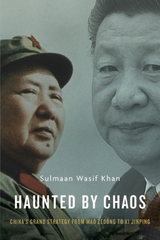
An American Interest Top Book of the Year
“Khan has unraveled the mystery of Chinese grand strategy, showing why insecurity lies at the root of Chinese power projection… Readers will not find a shrewder analysis as to why the Chinese act as they do.”
—Robert D. Kaplan, author of The Revenge of Geography
Before the Chinese Communist Party came to power, China lay broken and fragmented. Today it is a force on the global stage, and yet its leaders have continued to be haunted by the past. Drawing on an array of sources, Sulmaan Wasif Khan chronicles the grand strategies that have sought not only to protect China from aggression but also to ensure it would never again experience the powerlessness of the late Qing and Republican eras.
The dramatic variations in China’s modern history have obscured the commonality of purpose that binds the country’s leaders. Analyzing the calculus behind their decision making, Khan explores how they wove diplomatic, military, and economic power together to keep a fragile country safe in a world they saw as hostile. Dangerous and shrewd, Mao Zedong made China whole and succeeded in keeping it so, while the caustic, impatient Deng Xiaoping dragged China into the modern world. Jiang Zemin and Hu Jintao served as cautious custodians of the Deng legacy, but the powerful and deeply insecure Xi Jinping has shown an assertiveness that has raised both fear and hope across the globe.
For all their considerable costs, China’s grand strategies have been largely successful. But the country faces great challenges today. Its population is aging, its government is undermined by corruption, its neighbors are arming out of concern over its growing power, and environmental degradation threatens catastrophe. A question Haunted by Chaos raises is whether China’s time-tested approach can respond to the looming threats of the twenty-first century.
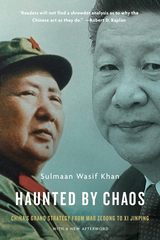
An American Interest Book of the Year
“Readers will not find a shrewder analysis as to why the Chinese act as they do.”
—Robert D. Kaplan
“An outstanding contribution to our understanding of that most urgent of contemporary geopolitical questions: what does China want?”
—Rana Mitter
Before the Chinese Communist Party came to power, China lay broken and fragmented. Today it dominates the global stage, and yet its leaders have continued to be haunted by the past. Analyzing the calculus behind decision making at the highest levels, Sulmaan Wasif Khan explores how China’s leaders have harnessed diplomatic, military, and economic power to keep a fragile country safe in a hostile world. At once shrewd and dangerous, Mao Zedong made China whole and succeeded in keeping it so while the caustic Deng Xiaoping dragged China into the modern world. Jiang Zemin and Hu Jintao were cautious custodians of Deng’s legacy, but Xi Jinping has shown a mounting assertiveness that has raised concern across the globe.
China’s grand strategies, while costly, have been largely successful. But will this time-tested approach be enough to tackle the looming threats of our age?
“Written with verve and insight, this will become the go-to book for anyone interested in the foundations of China’s grand strategy under Communist rule.”
—Odd Arne Westad, author of The Cold War
“Khan’s brilliant analysis will help policymakers understand the critical rise of China…Crucial if we are to avoid conflict with this emerging superpower.”
—Admiral James Stavridis, former Supreme Allied Commander of NATO
“Khan argues that since before the People’s Republic of China’s founding, Chinese rulers have held remarkably consistent objectives, even as their definition of security has expanded.”
—Mira Rapp-Hooper, War on the Rocks
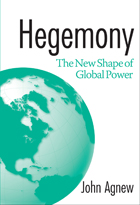

In this second volume in the Hoover Centennial Seminars series, seven scholars reexamine a major segment of Herbert Hoover's public career and in doing so offer fresh perspectives on the political, administrative, and diplomatic history of the 1920s. Drawing upon new materials and new insights, they reconstruct Hoover's transformation of the Commerce secretariat, explore his thinking and action in a variety of policy areas, and explode conventional depictions of Hoover's political conservatism. These essays show a resourceful and creative mind wrestling with the central problems of twentieth-century America and projecting solutions remarkably similar to current proposals for public use of the private sector.
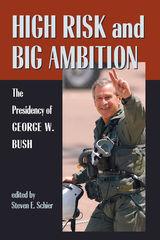
High Risk and Big Ambition brings together leading presidency scholars and journalists to assess the trajectory and character of Bush’s time in office. The common theme running through their contributions is that this presidency is best characterized by a series of bold political and policy risks in the service of two primary goals: the transformation of American foreign policy and the creation of a lasting Republican dominance of domestic politics.
Included are discussions of foreign policy, national security, the war in Iraq, Bush’s leadership style, religious politics, and economic policy. George W. Bush emerges as an "orthodox innovator" who skillfully deploys both personal politics and the power of his office in an effort to complete the conservative governmental agenda initiated by Ronald Reagan. Yet because of the size of his ambitions, each success sets up a greater risk of failure. That alone makes his presidency one of the most interesting and consequential in decades.
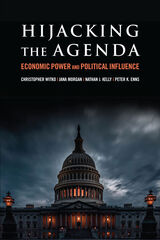
The authors analyze over 20 years of floor speeches by several hundred members of Congress to examine the influence of campaign contributions on how the national economic agenda is set in Congress. They find that legislators who received more money from business and professional associations were more likely to discuss the deficit and other upper-class priorities, while those who received more money from unions were more likely to discuss issues important to lower- and middle-class constituents, such as economic inequality and wages. This attention imbalance matters because issues discussed in Congress receive more direct legislative action, such as bill introductions and committee hearings. While unions use campaign contributions to push back against wealthy interests, spending by the wealthy dwarfs that of unions.
The authors use case studies analyzing financial regulation and the minimum wage to demonstrate how the financial influence of the wealthy enables them to advance their economic agenda. In each case, the authors examine the balance of structural power, or the power that comes from a person or company’s position in the economy, and kinetic power, the power that comes from the ability to mobilize organizational and financial resources in the policy process. The authors show how big business uses its structural power and resources to effect policy change in Congress, as when the financial industry sought deregulation in the late 1990s, resulting in the passage of a bill eviscerating New Deal financial regulations. Likewise, when business interests want to preserve the policy status quo, it uses its power to keep issues off of the agenda, as when inflation eats into the minimum wage and its declining purchasing power leaves low-wage workers in poverty. Although groups representing lower- and middle-class interests, particularly unions, can use their resources to shape policy responses if conditions are right, they lack structural power and suffer significant resource disadvantages. As a result, wealthy interests have the upper hand in shaping the policy process, simply due to their pivotal position in the economy and the resulting perception that policies beneficial to business are beneficial for everyone.
Hijacking the Agenda is an illuminating account of the way economic power operates through the congressional agenda and policy process to privilege the interests of the wealthy and marks a major step forward in our understanding of the politics of inequality.

When Hitler assumed the German chancellorship in January 1933, 34 percent of Germany’s work force was unemployed. By 1936, before Hitler’s rearmament program took hold of the economy, most of the jobless had disappeared from official unemployment statistics. How did the Nazis put Germany back to work? Was the recovery genuine? If so, how and why was it so much more successful than that of other industrialized nations? Hitler’s Economy addresses these questions and contributes to our understanding of the internal dynamics and power structure of the Nazi regime in the early years of the Third Reich.
Dan Silverman focuses on Nazi direct work creation programs, utilizing rich archival sources to trace the development and implementation of these programs at the regional and local level. He rigorously evaluates the validity of Nazi labor market statistics and reassesses the relative importance of road construction, housing, land reclamation, and resettlement in Germany’s economic recovery, while providing new insights into how these projects were financed. He illuminates the connection between work creation and Nazi race, agriculture, and resettlement policies. Capping his work is a comparative analysis of economic recovery during the 1930s in Germany, Britain, and the United States.
Silverman concludes that the recovery in Germany between 1933 and 1936 was real, not simply the product of statistical trickery and the stimulus of rearmament, and that Nazi work creation programs played a significant role. However, he argues, it was ultimately the workers themselves, toiling under inhumane conditions in labor camps, who paid the price for this recovery. Nazi propaganda glorifying the “dignity of work” masked the brutal reality of Hitler’s “economic miracle.”
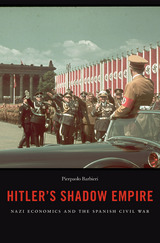
Pitting fascists and communists in a showdown for supremacy, the Spanish Civil War has long been seen as a grim dress rehearsal for World War II. Francisco Franco’s Nationalists prevailed with German and Italian military assistance—a clear instance, it seemed, of like-minded regimes joining forces in the fight against global Bolshevism. In Hitler’s Shadow Empire Pierpaolo Barbieri revises this standard account of Axis intervention in the Spanish Civil War, arguing that economic ambitions—not ideology—drove Hitler’s Iberian intervention. The Nazis hoped to establish an economic empire in Europe, and in Spain they tested the tactics intended for future subject territories.
“The Spanish Civil War is among the 20th-century military conflicts about which the most continues to be published…Hitler’s Shadow Empire is one of few recent studies offering fresh information, specifically describing German trade in the Franco-controlled zone. While it is typically assumed that Nazi Germany, like Stalinist Russia, became involved in the Spanish Civil War for ideological reasons, Pierpaolo Barbieri, an economic analyst, shows that the motives of the two main powers were quite different.
—Stephen Schwartz, Weekly Standard
READERS
Browse our collection.
PUBLISHERS
See BiblioVault's publisher services.
STUDENT SERVICES
Files for college accessibility offices.
UChicago Accessibility Resources
home | accessibility | search | about | contact us
BiblioVault ® 2001 - 2024
The University of Chicago Press









